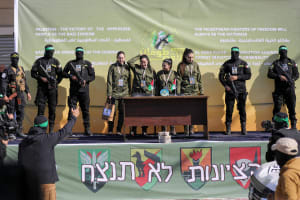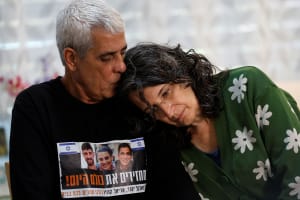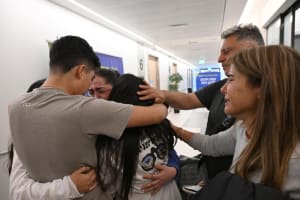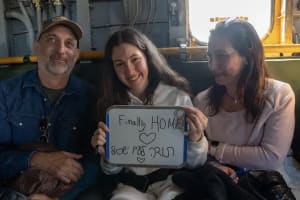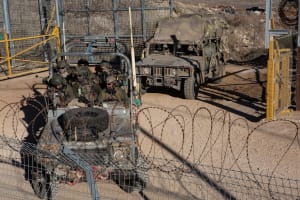On victory lap in Israel, Pompeo declares key to Middle East peace is military strength, willingness to ‘stand on the truth’ that Israel is the biblical Jewish homeland, not an occupying power
Former secretary of state and CIA director receives standing ovations as he receives award for advancing Abraham Accords and standing up to brutal Iranian regime

JERUSALEM—Mike Pompeo is on a multiple-day tour of Israel that could rightfully be called a “victory lap.”
Pompeo met with Israeli Prime Minister Naftali Bennett on Tuesday to discuss “a variety of subjects including the threat posed by Iran as well as the future of the Abraham Accords,” the Prime Minister's Office said.
Though the former secretary of state had close ties to former Prime Minister Benjamin Netanyahu, he has consistently praised Bennett who he said “has the Israeli people at his heart” and “will do the right things on security issues.”
But much of Pompeo's Israel visit this week has been focused on the former U.S. administration's historic accomplishments, specifically the Abraham Accords – and Pompeo's role in bringing them to fruition.
On Monday night, the former 70th U.S. secretary of state – and former CIA director – was given the “Peace Through Strength Award” by David Friedman, the former U.S. ambassador to Israel and senior Middle East advisor to President Donald Trump and Vice President Mike Pence.
Pompeo received several standing ovations from more than 500 VIP guests at the Museum of Tolerance in Jerusalem as Friedman and other speakers praised him for advancing the Abraham Accords, for being such a strong defender of Israel and for standing up to the brutal Iranian regime.
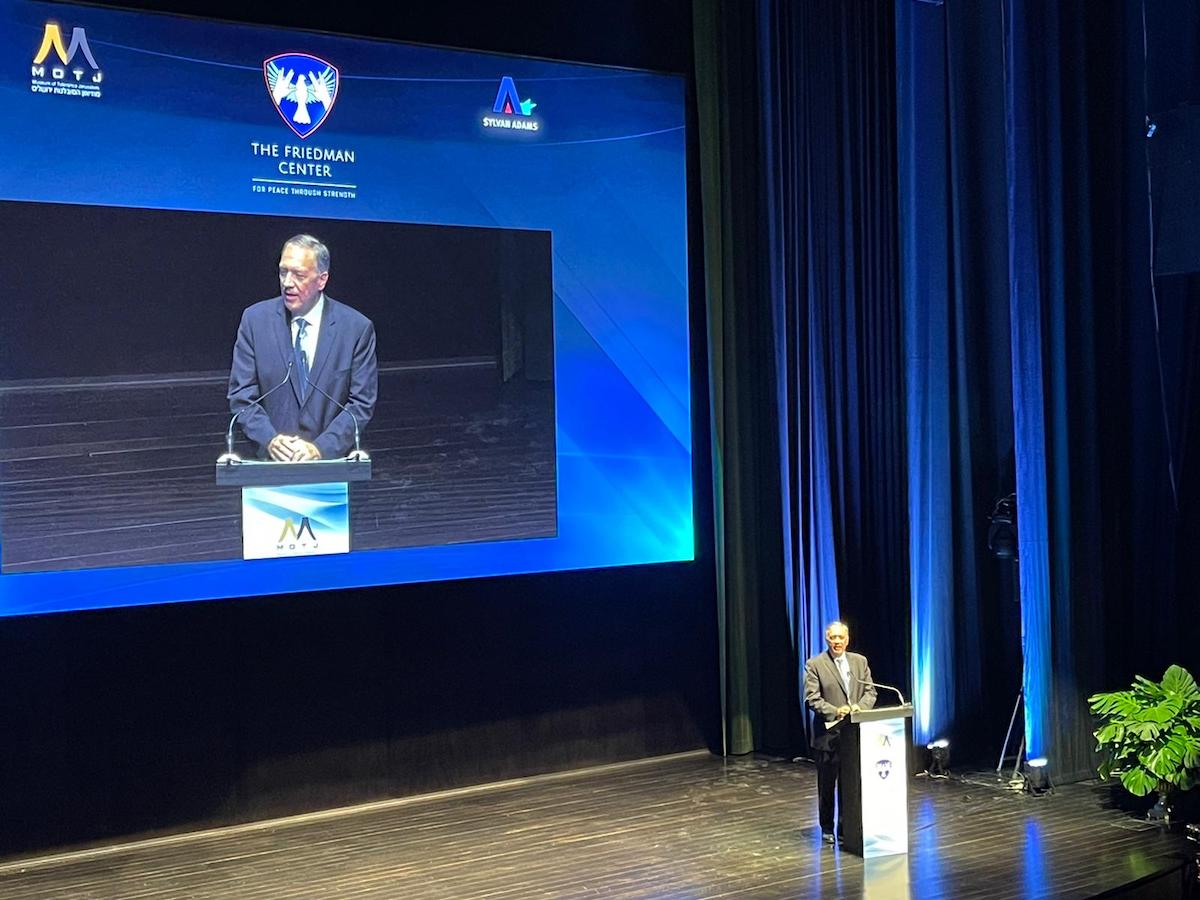
The occasion was Monday’s opening night gala for the new Friedman Center For Peace Through Strength. (see ALL ISRAEL NEWS coverage of the event here and here.)
On Sunday, Pompeo – accompanied by his wife, Susan, and his son, Nick – visited the biblical city of Shiloh and the Jewish-owned and operated Psagot Winery, located on territory that most world leaders call the “Israeli-occupied West Bank.”
Pompeo strongly rejects the term.
“This is the rightful homeland for the people of Israel here in Judea and Samaria,” Pompeo said at the winery, according to an article in The Jerusalem Post.
This is precisely the point he made as secretary of state in what became known as the “Pompeo Doctrine.”
“We recognized [when I was at State] that this is not an occupied nation, this [Israel] is not an apartheid country,” Pompeo explained. “It is a democracy where faiths can be practiced from all of the Abrahamic traditions.”
In his address, Pompeo – a devout Evangelical Christian who takes his faith in the Bible seriously – went further.
He argued that one of the most critical aspects of the United States’ ability to broker peace in the Middle East is not just projecting vigorous military and economic strength but the willingness of the White House and State Department to be willing to speak the truth with clarity and conviction.
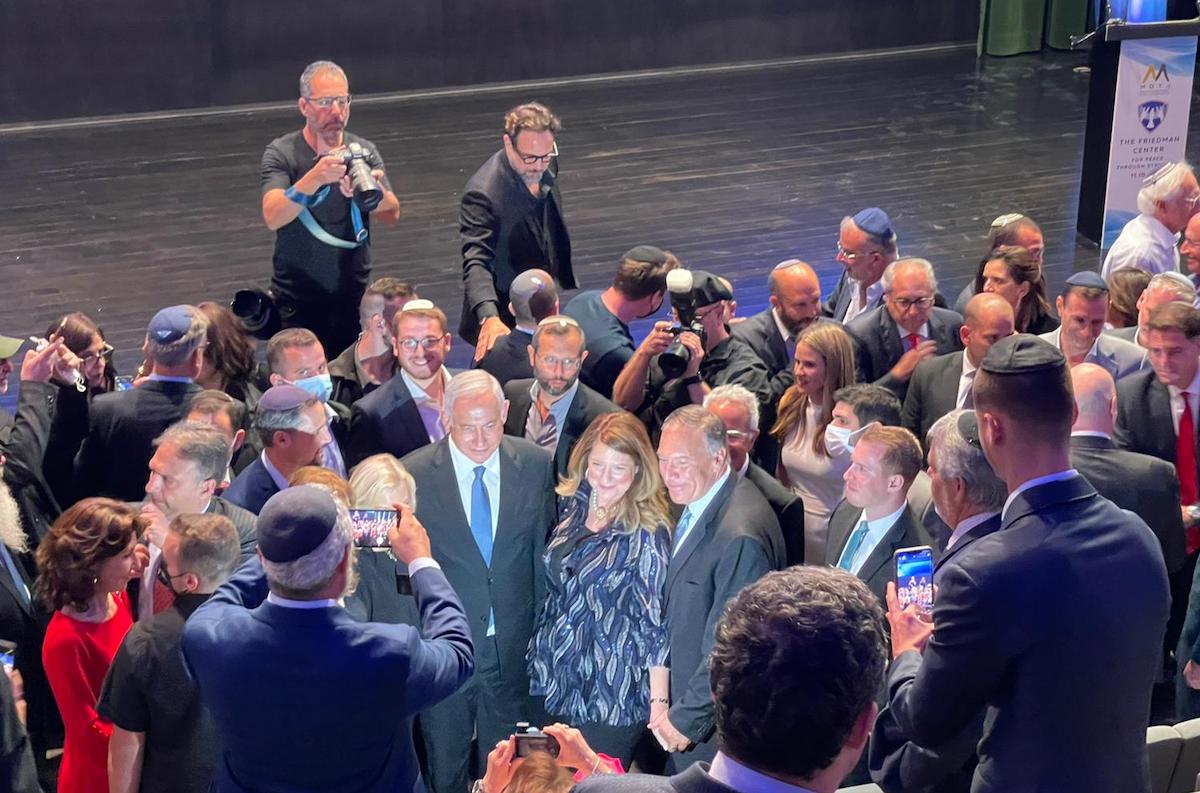
The fact that Jerusalem is the eternal capital of Israel is one such truth that must be articulated, Pompeo said.
So is the fact that the Golan Heights is sovereign Israeli territory, not Syrian territory, Pompeo added.
The response from the audience of Israeli, Arab and American government, business and faith leaders was tremendous.
Here is the transcript of his remarks — and I would encourage you to read it in full.
ADDRESS BY MICHAEL R. POMPEO
Friedman Center For Peace Through Strength
Oct. 11, 2021
Museum of Tolerance
Jerusalem, Israel
David asked that I speak tonight for just a minute about his central thesis of “peace through strength” that the Friedman Center, I know, will advance in the years and decades ahead.
David, I wish I was 30 years younger, too! [immense laughter]
As I look back, this idea is not particularly original.
The Roman Emperor Hadrian talked about peace through strength.
George Washington in the United States spoke about this.
And, of course, recently and famously, former President Ronald Reagan talked about peace through strength and how one engenders this peace around the world.
I saw this firsthand. I was a young cadet [at West Point]. I was applying for a scholarship. I had decided that day — it was a civilian group doing the interviews to see who would get the scholarships and I decided to wear my uniform. I don’t think that made too many of them happy.
[The interviewer asked why Pompeo was attending a military academy and why there were no “peace academies.”]
Knowing full well that I wouldn’t get the scholarship at this point – it was a hostile question, for sure – I paused for a moment.
Because I knew in my heart that I had attended a peace academy.
I attended an institution that would help create American strength, so that we would have to fight fewer wars.
And indeed, the central thesis of our [Trump-Pence] administration was to make sure that America was strong in every dimension such that we could help facilitate, certainly, peace for our country, but also peace for every nation in the world, as well.
The work that led to the Abraham Accords had so many hands.
But there were a number of ideas [that guided our work].
First is the truth.
Peace is difficult to maintain if one is unprepared to stand on the truth.
We acknowledged – rightfully – that the capital of the State of Israel, the Jewish homeland, was in fact Jerusalem, and that our embassy ought to be there.
This is just a simple truth.
The fact that the Golan Heights is the proper sovereign space of the State of Israel was just a reality.
It was the truth, and we spoke to that in a very real way.
Some time later, Ambassador Friedman and I ultimately issued a statement making unambiguously clear that Israel is not, in fact, an occupying nation. [enthusiastic applause]
This is just the unambiguous truth.
And I saw – I was in Shilo yesterday…. [enthusiastic applause] ….talking about peace with such good and strong people.
The second thing that’s required is clarity.
One needs to be unambiguous about who the good guys are, and those who are striking evil and fear in the world.
We were clear about this.
We knew the problems that the Islamic Republic of Iran was driving throughout the region.
We knew that this nation [Israel] was working diligently to do everything it could to create peaceful solutions throughout the region.
So, we were friends with Israel, and ardent adversaries of the Iranian theocracy. Clarity matters. Peace follows from strength, truth and clarity. [applause]
When I was a young officer – not long after that interview that ended poorly [laughter] – I patrolled what was the then-East German border. And about two weeks before The [Berlin] Wall came down, I left. My assignment was complete.
And when the wall came down, I called back to one of my buddies, one of my fellow lieutenants, and I said, “This is amazing. What has taken place?”
We saw peace occur because we had strong allies and strong friends, and we were fearless in American pursuit of peace.
And he said, “Mike, it’s the most amazing thing. We’ve been patrolling this border trying to keep out the communists from [East] Germany and from [Eastern] Europe. And when that fence came down, traffic only flowed one way. It flowed towards freedom.”
We should never forget the truth and clarity and the yearning for people to be able to practice their faith – for people to be tolerant – it is something that people all across the world are demanding.
And good leaders can help them get there.
The final idea that I would leave you with – and this goes for everyone here tonight – is that to deliver “peace through strength” requires not just military might, and not just truth and clarity and purpose, but all of the strength that nations and sovereign countries are able to muster.
And breakthroughs ultimately happen when people elect and raise up leaders – fearless leaders – who are prepared to take some risk in order to deliver on that peace, and are prepared when the peace is not at hand to continue to deliver strength.
So, when you [a previous speaker] mentioned the debacle in Afghanistan, we were determined to reduce risk from Afghanistan and create peace in that region, as well.
But we knew – our administration knew – that it was important that we remain strong through the end, and we not permit a weak America to be foiled in the mission that we had devoted so much energy to for two decades.
When good leaders rise – leaders like Prime Minister Netanyahu [applause], and Mohammed bin Zayed in the United Arab Emirates, and the King and Crown Prince of Bahrain, and the leaders of Sudan and Morocco, who were all prepared to take real risks because they knew the right thing was to recognize the State of Israel; to no longer have as their central foreign policy thesis the destruction of this Jewish nation; this, my friends, is important – keep rewarding those leaders.
Keep thanking those leaders.
Keep raising up those leaders – your mayors, your governors, your Members of the Knesset leaders who will one day have the courage and strength to deliver the kinds of peace that we were so blessed in the United States and the Trump administration to be a part of.
David, thank you so much for honoring me, and my wife, Susan and my son, Nick, and our family, and all of the people who were part of our administration that delivered these remarkable outcomes.
I’m confident – I am confident – that the people in these countries, no matter what administration there is in the United States, understand that these outcomes are good for them and that they need to isolate the bad guys.
Like the people who only want freedom in Iran, but have a tyrannical regime ruling over them.
One day, too, they will have the opportunity to become a peace-loving nation, as well.
Thank you all so much.
[applause and standing ovation]

Joel C. Rosenberg is the editor-in-chief of ALL ISRAEL NEWS and ALL ARAB NEWS and the President and CEO of Near East Media. A New York Times best-selling author, Middle East analyst, and Evangelical leader, he lives in Jerusalem with his wife and sons.


